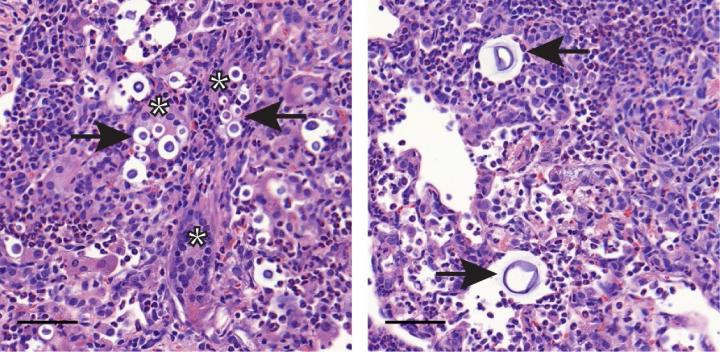
Credit: Heung 2019
Immune cells called inflammatory monocytes are often one of the first responders to infections, but they actually facilitate the progression of Cryptococcus neoformans infection in mice, according to a study published March 21 in the open-access journal PLOS Pathogens by Lena Heung and Tobias Hohl of Memorial Sloan Kettering Cancer Center. According to the authors, these disparate results indicate that inflammatory monocytes possess a plasticity of function that can regulate infection outcomes, making them an important target for immunomodulatory therapies against C. neoformans.
C. neoformans is a yeast that is prevalent throughout the environment and can result in a fatal infection of the central nervous system when inhaled into the lungs by patients with impaired immune systems. Our understanding of the immune responses that either help clear C. neoformans from the lungs or permit development of disease remains limited.
In the new study, Heung and Hohl used a mouse model of lethal C. neoformans infection to discover that inflammatory monocytes facilitate the progression of infection rather than clearance. In the absence of inflammatory monocytes, murine survival is improved and there is decreased fungal burden in the lungs and other sites. The results reveal a novel and critical role for inflammatory monocytes in mediating detrimental host outcomes in a model of fatal respiratory infection with C. neoformans. These findings contrast with the beneficial functions of inflammatory monocytes described in mouse models of other fungal infections. According to the authors, the results establish a foundation for future work to target the immune response of inflammatory monocytes as a strategy to improve the outcomes of patients who develop C. neoformans infections.
###
Peer-reviewed; Experimental study; Animals; Cells
Research Article
Funding: LJH is supported by NIH/NIAID grant K08 AI130366 and fellowships from the Stony-Wold Herbert Fund and from the Dana Foundation as an MSKCC Clinical Scholar. TMH is supported by NIH/NIAID grant R01 AI093808 and a Burroughs Wellcome Fund Investigator in the Pathogenesis of Infectious Disease Award. This research was funded in part by NIH/NCI Cancer Center Support grant P30 CA008748. The MSKCC Integrated Genomics Operation is supported in part by Cycle for Survival and the Marie-Josée and Henry R. Kravis Center for Molecular Oncology. The funders had no role in study design, data collection and analysis, decision to publish, or preparation of the manuscript.
Competing Interests: The authors have declared that no competing interests exist.
Citation: Heung LJ, Hohl TM (2019) Inflammatory monocytes are detrimental to the host immune response during acute infection with Cryptococcus neoformans. PLoS Pathog 15(3): e1007627. https:/
Author Affiliations:
Infectious Diseases Service, Department of Medicine, Memorial Sloan Kettering Cancer Center, New York, New York, United States of America
Immunology Program, Sloan Kettering Institute, Memorial Sloan Kettering Cancer Center, New York, New York, United States of America
In your coverage please use this URL to provide access to the freely available paper: http://journals.
Media Contact
Lena Heung
[email protected]
Related Journal Article
http://dx.




